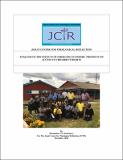| dc.contributor.author | Dieudonn'e, Micomyiza N. N | |
| dc.date.accessioned | 2021-01-04T08:52:53Z | |
| dc.date.available | 2021-01-04T08:52:53Z | |
| dc.date.issued | 2018-12 | |
| dc.identifier.citation | Dieudonn'e, M. (2018). ANALYSIS OF THE EFFECTS OF EMERGING ECONOMIC TRENDS IN ON ACCESS TO CHILDREN’S RIGHTS. Lusaka, Zambia: Jesuit Centre for Theological Reflection (JCTR) | en |
| dc.identifier.uri | https://repository.jctr.org.zm/handle/20.500.14274/148 | |
| dc.description | The Jesuit Centre for Theological Reflection (JCTR), a faith based organization and a ministry of the Society of Jesus, strives to translate into action Christian principles and values related to
promoting social justice in Zambia. The quest to promote social justice is well captured in its vision and mission which places emphasis on justice, the centrality of faith and the poor. The JCTR conducts its programmes through research, education, advocacy and consultations respectively. Through a partnership with Save the Children International (SCI), the JCTR is undertaking a project to implement various interventions to promote public investment in children. The project, entitled ‘Public Investment in Children’, has its overall objective of promoting increased Government resource allocation to education, health, water and sanitation and child protection interventions/ services. The JCTR understands that education, health and water and sanitation are basic essentials for any child to thrive and the same can be said about social protection which facilitates realization of the above services for the most vulnerable members of our society. Realization of improved access to these invaluable social services however is often hampered by disruptions in economic growth trends which this paper attempts to analyse and offer suggestions on addressing them in order to guarantee smooth budgetary spending for the realization of children rights. The Zambian economy has been growing at a rate of over 6% per annum of GDP until recently when the growth decelerated to around 3% per annum. While children continue to face harsh reality amidst sound economic growth, the situation could become worse with the recent disruption in economic fundamentals in the economy. This paper therefore attempts to understand these realities vis-a-vis realization of children rights. | en |
| dc.description.abstract | Governments that are party to the United Nations Convention on the Right of the Child including Zambia have a responsibility to take all measures to make sure children’s rights are respected, protected and fulfilled. These measures include review of laws relating to children assessing their levels of services such as health and education as well as levels of funding for these services.
Government are therefore obliged to take all necessary measures including increased resource allocation to ensure that the minimum standards set by the Convention in these areas are progressively being met. Government’s capacity to facilitate protection and fulfillment of children rights is usually hampered by disruptions in economic growth. This paper has analyzed the effects or likely effects of the current economic trends that have threated sustained economic growth and development in
regard to access to children rights. Specifically, the paper has analyzed Zambia’s growing budget deficit, public debt – both internal and external debt as well as the accompanying corrective policies with the aim of reversing the current economic trend. The paper notes that Zambia’s economic growth rate has decelerated in the last three years from annual growth rates of around
6% experienced five years ago to around 3% in 2017. This drag in economic growth has been among other things been influenced by deteriorating fiscal and debt situation which have increased to an estimate of 7.4% of GDP in 2018 and US$ 15.95 billion. This trend has a potential to divert government resources from key social sectors that protects and fulfills children rights such as education, health and social protection as governments prioritizes loan repayments over allocations to such sectors. The paper has demonstrated that increasing fiscal deficit and public debt and the accompanying fiscal consolidation measure being implemented under the Zambia Economic Plus Programme have crowded out financial allocations to the education and health sectors as well as the social protection programmes over allocations to loan repayment. These are key sectors as far as children
rights protection is concerned. 2018 budget too reveals insignificant budgetary allocation increases to these sectors while allocations to loan repayment has skyrocketed. | en |
| dc.description.sponsorship | Save the Children International (SCI) | en |
| dc.language.iso | en | en |
| dc.publisher | Jesuit Centre for Theological Reflection | en |
| dc.rights | Attribution-NonCommercial-ShareAlike 3.0 United States | * |
| dc.rights.uri | http://creativecommons.org/licenses/by-nc-sa/3.0/us/ | * |
| dc.subject | Children's rights;The economy and children's rights;Public investment in children | en |
| dc.title | Analysis of The Effects of Emerging Economic Trends in on Access to Children’s Rights | en |
| dc.type | Other | en |

